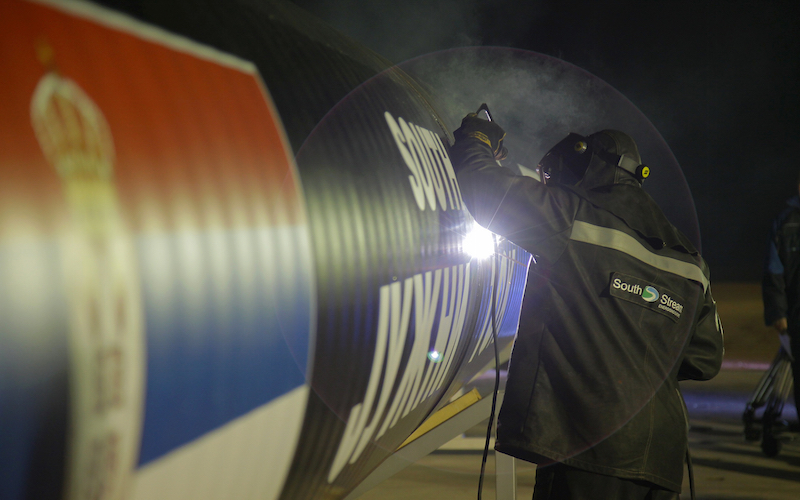
Canceling the South Stream Project: The Woes of Energy Insecurity
Political language is a vast preserve of euphemism. Energy security, one of more appropriate candidates of euphemistic consideration, has been on the lips of policy planners from Moscow to Washington for decades. The very idea does little to mask the titanic tussles over energy supplies, who controls, not merely the assets, but the means with which these will be delivered. Where there is an energy reserve, be it natural gas, oil, or some other usable commodity, there will be money and blood.
The cancellation by Moscow of the South Stream project in preference for an agreement with Turkey can be read in several ways. The South Stream route was touted as an alternative, adding to the North Stream counterpart that would bypass troublesome Ukraine as a transit point for delivering energy.
The energy game rarely has heroes, but it is certainly has various villains. While the European Union stresses going green and reducing traces of its considerable carbon footprint, it has also sought, over the years, a greater liberalisation of energy markets, one of them being Russia. (Liberalisation can be measured in terms of which companies are allowed a slice of the export pie, rather than any moral value.)
The Russian government’s stranglehold over natural gas supply has been unchallenged, with such gargantuan entities as Gazprom ruling the roost.
Such government monopolies jar with European preferences towards energy competition, though it should be noted that the South Stream project had, on the books, additional European partners in the form of Italy’s ENI (20 percent), France’s EDF (15 percent) and Germany’s Wintershall, subsidiary of BASF (15 percent).
A key reason cited by Putin in focusing on Turkey and cancelling the South Stream project lies in the European Commission’s insistence in its “Third Energy Package” that no single company control the full process of extraction, transportation and sale of energy. That has been a vital, and misguided weapon, in the European Commission’s broader game.
Other considerations may well be operating, not least the continued insistence on sanctions over the Ukraine crisis, something which is having its own detrimental effect on European markets. Germany has fared particularly poorly with the loss of Russian business. Brussels keeps insisting on bruising and biting the state-owned hand that feeds it.
Bulgaria has also come out poorly, with Sofia being accused by Putin of being unduly tardy. “Considering that we still have not received a [construction] permit in Bulgaria, we believe that Russia cannot continue the implementation of this project in these circumstances.” While there had been much backing for the project in Bulgarian political circles, Sofia has also been heckled by the European Commission’s insistence that EU member states renegotiate bilateral agreements on South Stream to conform to the Third Energy Package.
What it, and Brussels has gotten, is a grand Eurasian power play centred on Turkey as the new transit point for energy and raw materials. (It already is one for Azerbaijan oil via the Baku-Tblisi-Ceysan pipeline.) To become a true energy “hub,” however, Ankara’s lawyers will have to read the fine print as to whether the country has such important items as resell rights.
The deal between Moscow and Ankara is more than just an energy deal over a rerouting of the project. There will be no net loss for Gazprom, which can focus on Turkey, the company’s second business customer after Germany, while also giving a boost to other parts of Turkish industry. Bulgaria, for all of that, seemed small beer, though its project losses at around 400 million Euros will be felt.
The negative impact in the Balkans has been notable, and replays in several ways the delicate politics between Russian interests in the region, its tiptoeing with Turkey, and European demands that various EU “rules” be complied with. Always caught between in the vice of history and the powers of expediency, the Balkan states have rarely made it to the winners’ podium. Several countries on route were posed to benefit, both directly and incidentally. Instead, the South Stream has been exited in favour of a Turk Stream. “This is what the New Great Game in Eurasia is about,” posed the Asia Times.
Serbia has felt the cancellation keenly, more so for the fact that Belgrade sold a majority stake in its own state oil and gas company, NIS, to Gazprom in 2008 hoping to get something in return. As early as November 21, one of Gazprom’s subsidiaries issued a call for builders, welders and mechanics to assist in construction of its Serbian leg of the pipeline. As Branko Tasevski of the Veco Welding Company located in Zrenjanin explained, “We thought we’d earn enough to sustain us for the next five to six years. We lost not only potential profits but also references for future deals.”
Such a deal suggests the parlous nature of energy politics. Deals done one day may be neutered the next. The 2008 NIS-Gazprom deal might have been seen as having fraternal freight on future energy construction passing through Serbia, but it was not to be. “We sold them the family jewels, as brothers,” argues Misa Brkić of the Serbian weekly Novi Magazin, “without asking for any guarantee that they would make good their promise.” Lack of clarity has always been the case when making concession over such jewels.
While the Balkans and the EU fall on heavy days over the latest energy manoeuvrings, the hardened regimes in Ankara and Moscow have made a critical outflanking move – and it is one stashed with economic importance.

